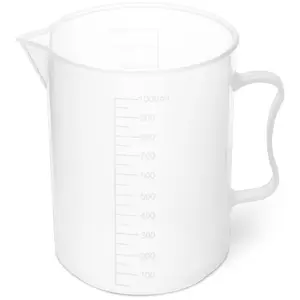Labroratory Beakers

Soxhlet Extractor - with reflux condenser and titration flask (500 ml)
Lowest price in the 30 days before the discount: €159.00

Laboratory Glassware – measuring cylinder + 3 glass pipettes – 4-piece set
Lowest price in the 30 days before the discount: €65.00

Laboratory Glassware - Erlenmeyer flasks - 3-piece set
Lowest price in the 30 days before the discount: €89.00

Laboratory Bottle - 10 l
Lowest price in the 30 days before the discount: €129.00

Graham Condenser - 500 ml
Lowest price in the 30 days before the discount: €65.00

Liebig Condenser - 500 ml
Lowest price in the 30 days before the discount: €65.00

Separating Funnel - 2000 ml - standard ground joint: 24/29 - PTFE stopcock
Lowest price in the 30 days before the discount: €99.00
- First
- 1
- Last
Plastic Laboratory Beaker for professional use and home science
Plastic measuring cups are used for determining the quantity of a liquid. The advantage of plastic measuring cups over glass ones is their robustness. A plastic measuring cup is not damaged, even when it falls from a great height. Plastic measuring beakers with a capacity of 500 millilitres are just as much part of the basic equipment of every laboratory as plastic measuring beakers with a capacity of 1 litre and plastic measuring beakers with a capacity of 2 litres. When working with electric laboratory stirrers, plastic measuring cups show their advantages over more fragile materials such as glass.
In many industrial plants where liquids are handled, measuring cups are indispensable tools. Plastic measuring beakers are used, for example, to measure paints and solvents. Plastic measuring cups are also used in the food industry. For example, if a plastic measuring cup with a volume of 1 litre breaks during food production, there is no risk of dangerous splinters getting into the product and rendering entire batches unusable.
In the household, plastic measuring cups are used for many different purposes. Plastic measuring cups with 500 ml capacity and plastic measuring cups with 1 litre capacity are often used for cooking. Plastic measuring cups with a capacity of 2 litres or more can be found in many hobby workshops and allotment gardens, for example for preparing liquid fertilizer.
Construction and use of a lab beaker
Whether you order a plastic measuring cup on Amazon or choose another supplier, the design of the plastic measuring cups with 500 ml capacity and other sizes is always similar. Plastic measuring cups with a capacity of 1 litre, plastic measuring cups with a capacity of 2 litres and even larger models are usually cylindrical in shape. Small plastic measuring cups are frequently cone-shaped to achieve a high measuring accuracy even with small quantities.
Regardless of their size, plastic measuring cups are best made of transparent materials such as colourless polypropylene (PP). Their transparency ensures that the measured value scale with quantity information can be printed on the outside of the plastic measuring cups and still be easily legible even after the measuring cups have been used for a long time.
Plastic measuring cups made of polypropylene are characterized by high resistance to acids, bases and a wide variety of solvents. They are also heat-resistant. All plastic measuring cups that you find in our range at expondo.de can be filled with 100 °C hot liquids without any worry.
What is a beaker used for in a lab?
In laboratories, analytical procedures require varying quantities of liquids. The scale ranges from several litres down to a few microliters. For measuring particularly small quantities, a micropipette rather than a plastic measuring beaker should be used. If information on solids suspended in liquid is required, an examination under the microscope provides all you need to know. If a plastic measuring beaker has to be positioned at a very specific height in an experimental setup, a laboratory lifting platform is a valuable helper.



